Key takeaways:
- Pro-life advocacy emphasizes the sanctity of life and supports vulnerable populations beyond just opposing abortion.
- Educational resources, including workshops and diverse materials, are vital for informed and empathetic discussions around pro-life issues.
- Personal experiences, such as engaging with pro-life organizations and online discussions, can significantly enhance understanding and commitment to advocacy.
- Effective advocacy involves combining factual resources with personal stories and facilitating collaborative learning experiences.
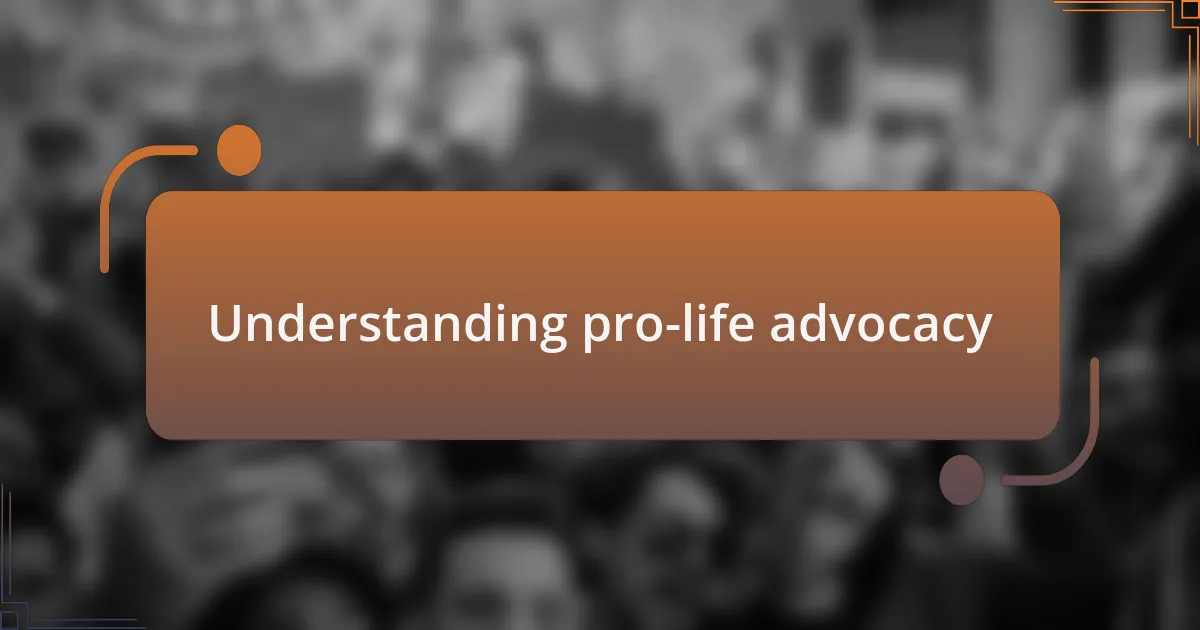
Understanding pro-life advocacy
Pro-life advocacy centers around the belief in the sanctity of life, from conception to natural death. When I first encountered this perspective, I found myself reflecting on what life truly means. It made me wonder: how can we prioritize a society that values all human beings, regardless of their circumstances?
As I delved deeper, I realized that pro-life advocacy is not just about opposing abortion; it’s a commitment to supporting vulnerable populations. I recall an event where I listened to the stories of women who faced unplanned pregnancies. Their experiences illuminated the complex emotions involved, challenging my preconceived notions and reminding me of the profound struggles many face.
Connecting with others who share this belief has been impactful as well. I’ve witnessed how community support can transform lives, offering resources and a sense of belonging. It raises an essential question: how can we better equip ourselves and others to foster a culture that nurtures life in all its forms? This exploration continuously opens my eyes to the multifaceted nature of pro-life advocacy.
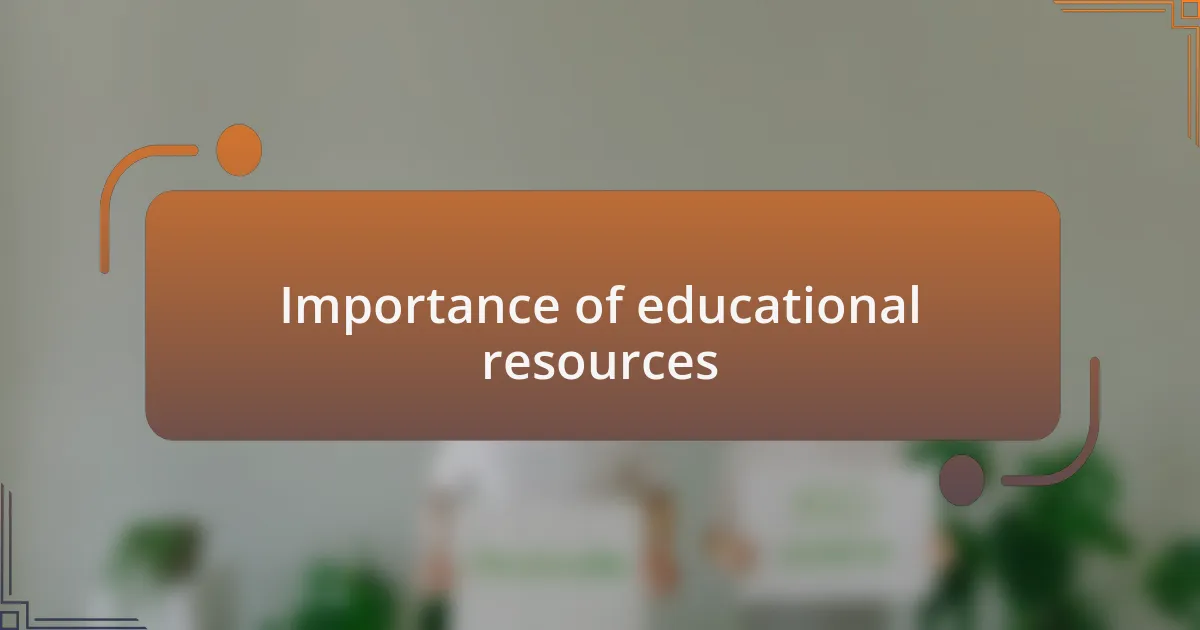
Importance of educational resources
Educational resources play a crucial role in shaping our understanding of pro-life advocacy. I remember attending a workshop focused on reproductive health and ethics, which dramatically shifted my perspective. The information I gained empowered me to engage in conversations more confidently, allowing me to articulate the pro-life stance with compassion and clarity.
Throughout my journey, I’ve found that educational materials can bridge gaps between differing opinions. For instance, I once read a compelling book that detailed the emotional and psychological impacts of abortion on women. This resource prompted me to reflect on the profound complexities involved and equipped me with the knowledge to approach discussions with empathy—something I believe is vital for meaningful dialogue.
Moreover, being well-informed helps us advocate effectively within our communities. I’ve noticed how sharing credible information during community outreach can dispel myths and encourage others to think critically about life issues. Isn’t it fascinating how education can be a catalyst for change, fostering an environment where every human life is valued?
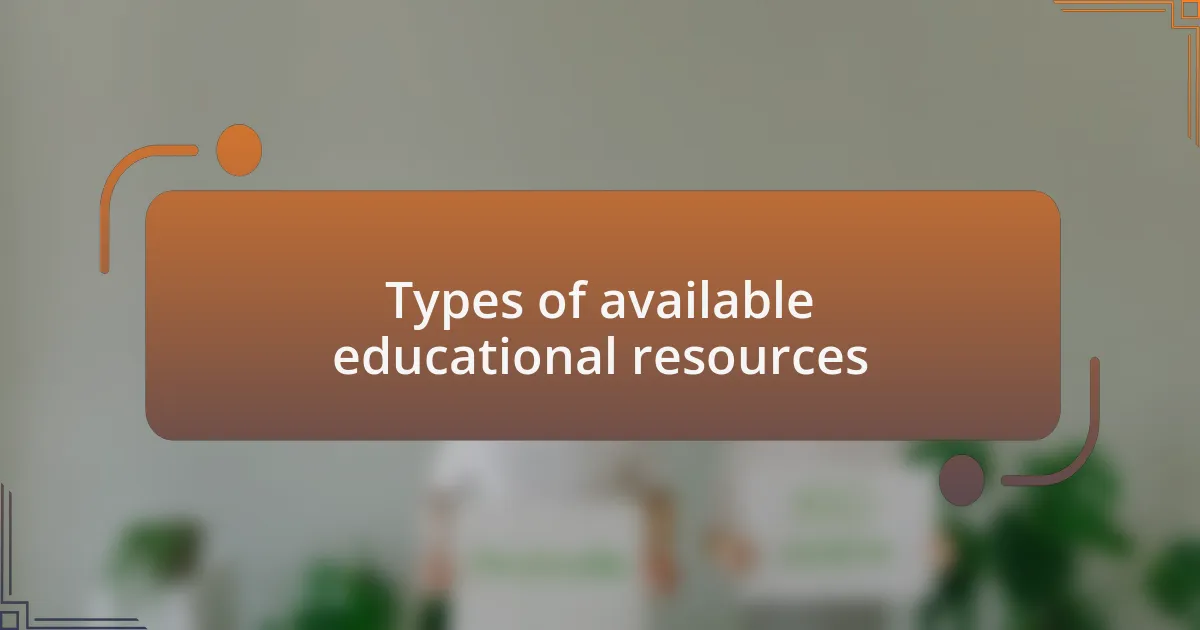
Types of available educational resources
There are several types of educational resources available that cater to different learning styles and needs. For instance, I often turn to documentaries and films, which provide powerful visual narratives that can profoundly affect viewers. One such film I watched featured personal stories from women affected by abortion, revealing layers of emotional experiences that statistics alone cannot convey. Have you ever found that a documentary changed your viewpoint on a complex issue?
Books and articles also serve as invaluable resources, offering in-depth analysis and various perspectives on pro-life advocacy. I vividly recall digging into a collection of essays by both pro-life and pro-choice authors. This allowed me to appreciate the nuances of each argument, enhancing my understanding of the topic. It’s important to challenge ourselves with diverse materials; doing so expands our perspective and equips us to engage more thoughtfully in discussions.
Additionally, community programs and workshops play a vital role in fostering local advocacy. One memorable event I attended involved a panel of speakers that included healthcare professionals and educators. Hearing their insights not only informed my stance but also inspired me to take action in my community. Have you considered participating in local initiatives? Engaging with others in such settings can often spark motivation and new ideas.
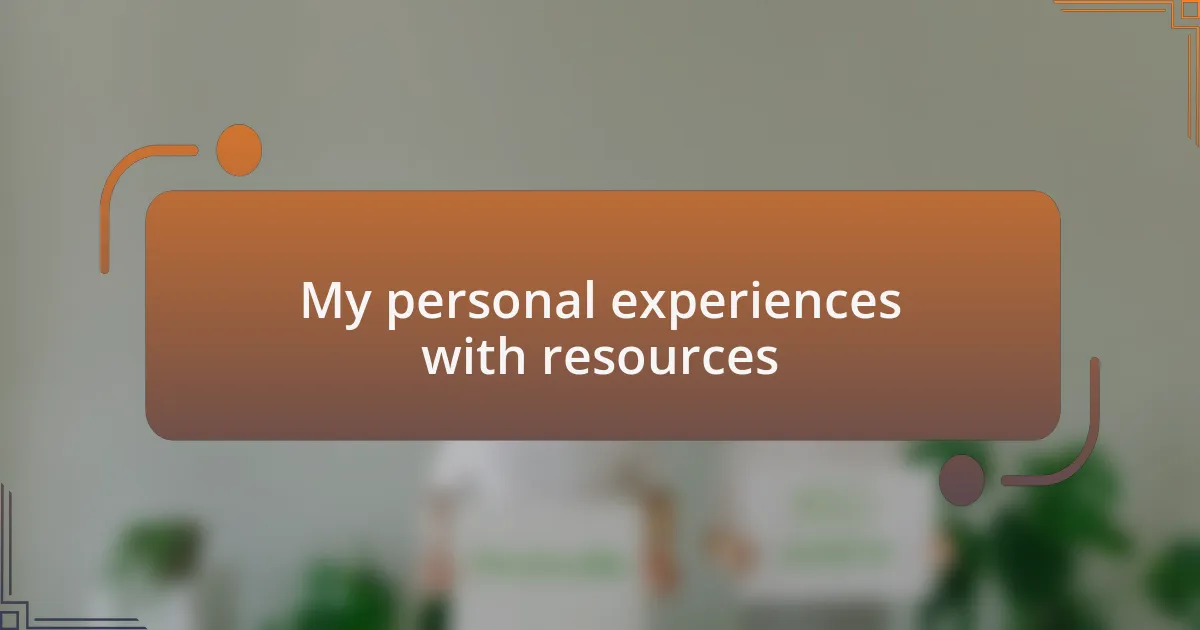
My personal experiences with resources
When I think about my personal experiences with educational resources, one moment truly stands out. I stumbled upon an online course that delved into the moral and ethical implications of pro-life issues. The material was thoughtfully presented, and I found myself captivated by the discussions. Participating in the live Q&A sessions allowed me to ask questions directly to experts, and their answers often challenged my existing beliefs. It was a transformative experience—have you ever found a course that reshaped your understanding of a topic?
Another invaluable resource for me has been engaging with pro-life organizations that provide webinars and training sessions. I remember vividly attending a workshop where activists shared their firsthand experiences. I was struck by the raw honesty of their stories and how they bravely navigated complex situations. It brought to light the emotional stakes involved in advocacy and reinforced my commitment to the cause. Have you had moments where hearing someone else’s journey compelled you to take action?
Finally, I often turn to social media for real-time updates and diverse opinions. While some may view it as a source of misinformation, I’ve found groups that foster healthy dialogue and share educational content that resonates with me. I recall participating in an online discussion that took a deep dive into legislative changes affecting women’s health. I was amazed at how passionate and informed individuals could be, even in a digital space. Do you leverage social media to enhance your understanding of important issues? It’s incredible how it can connect us and broaden our horizons if used thoughtfully.
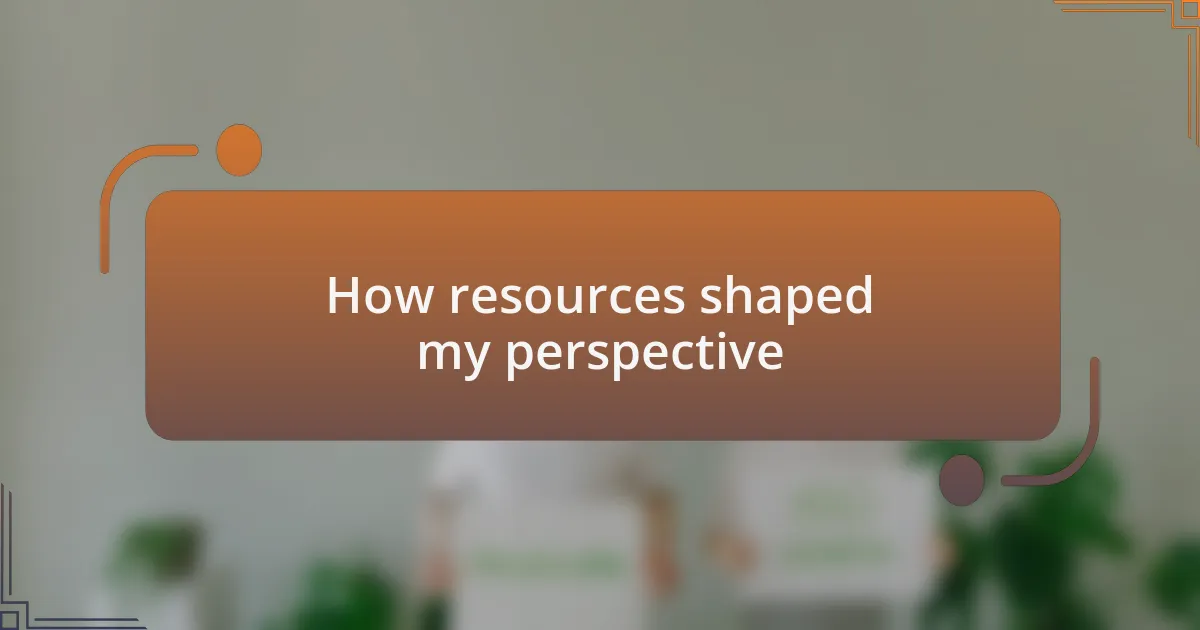
How resources shaped my perspective
Resources have significantly reshaped my perspective on pro-life advocacy by challenging me to consider various viewpoints. I recall an in-depth article I read that presented both the arguments for and against certain pro-life policies. This balanced approach forced me to question my assumptions and dig deeper into the complexities of the issue. Have you ever encountered content that pushed you to rethink your stance?
One particularly eye-opening moment came when I watched a documentary highlighting the stories of women from different backgrounds affected by abortion. Their diverse experiences and emotional narratives profoundly impacted me, stirring a sense of empathy I hadn’t fully grasped before. It was a reminder that advocacy isn’t just about ideologies—it’s about real lives and the choices they make. Can you relate to a time when a story moved you to reconsider your beliefs?
Engaging in community discussions has also played a crucial role in shaping my understanding. I remember attending a local forum where individuals shared their varying perspectives, each rooted in personal experiences. The warmth and honesty in those conversations opened my eyes to the nuances of the pro-life movement, making me realize the importance of listening. Have you had the chance to participate in such discussions that broaden your perspective?
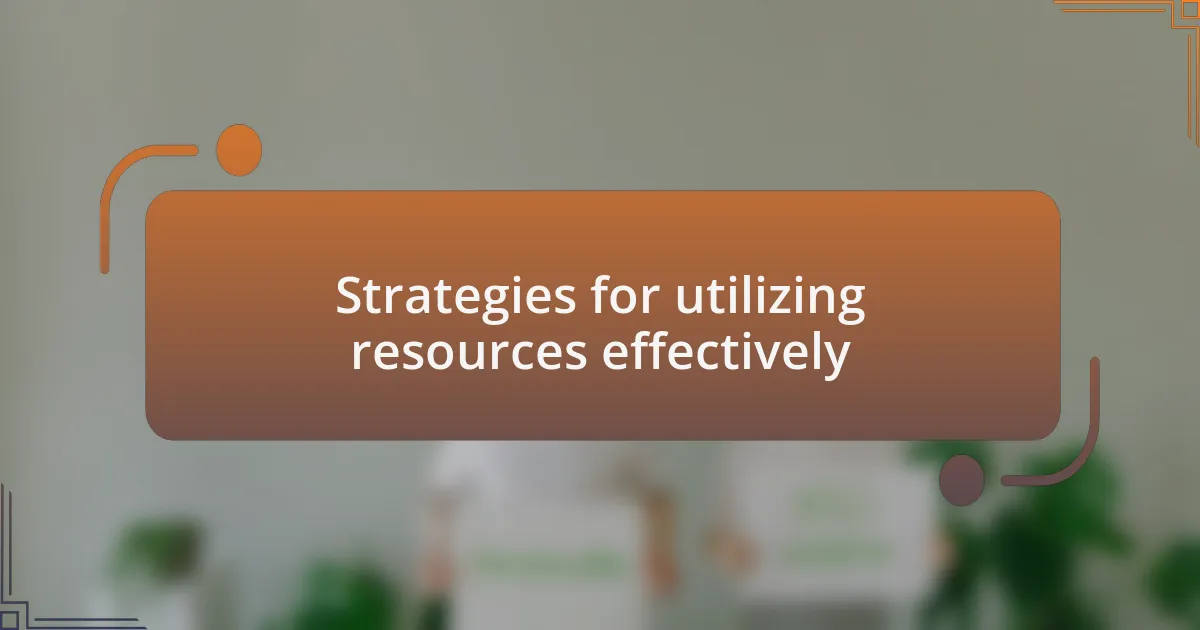
Strategies for utilizing resources effectively
Utilizing educational resources effectively requires a strategic approach to ensure they resonate deeply with both our understanding and advocacy efforts. I remember when I meticulously curated a list of articles and videos tailored to address specific arguments against pro-life positions. This focused selection allowed me to respond thoughtfully in discussions, while also keeping me anchored in the facts as I navigated tricky conversations. Have you considered refining your resource list based on the challenges you face in conversations?
In my own experience, I found that pairing resources with real-life testimonials boosts their impact. For instance, after reading compelling research on fetal development, I shared it alongside a heartfelt testimony from a parent who chose life for their child despite challenges. This combination not only strengthened my argument but also evoked deeper emotional responses from listeners. How do you think merging facts with personal stories can enhance your advocacy efforts?
Another strategy I’ve employed is hosting small study groups to delve into specific topics related to pro-life advocacy. These gatherings enable shared insights and foster supportive dialogue, turning the act of learning into a collaborative experience. I can still recall the moment a peer’s perspective shifted when we examined the intersection of pro-life values and social justice together. It sparked a transformative discussion that deepened our collective understanding. Have you ever tried group learning to magnify your advocacy efforts?